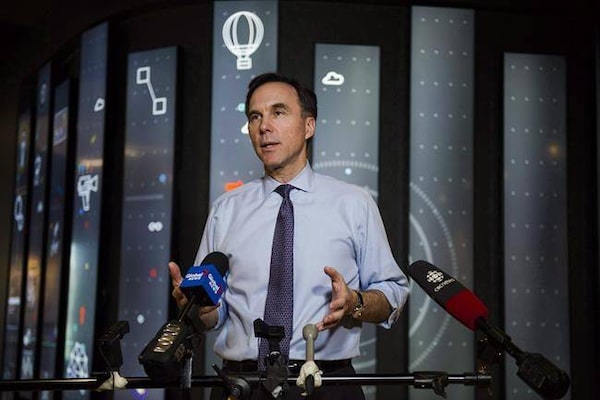
Finance Minister Bill Morneau met with private sector economists earlier in February to get their advice on the budget he will present Tuesday.Christopher Katsarov
The federal government has clearly signalled that it will offer only a limited financial package for the media industry in Tuesday's budget, prompting a major lobby group to take its campaign for assistance to the provincial level.
Federal officials, who spoke about the coming budget on the condition of anonymity, said there will be no measures designed to extract revenues from major foreign-based internet companies or any changes to the treatment of advertising under the Income Tax Act.
A senior federal official said the government is looking to provide $10-million a year over five years to fund local journalism through an arms-length organization in a bid to preserve journalistic independence. In particular, sources said that the government wants to promote journalism in local and community news organizations.
The official said the federal government will be "exploring" the possibility of giving non-profit status to media organizations to help them raise revenues for their work. The timeline for the federal study of this proposal remains unclear.
Media groups have tried in recent months to increase pressure on the federal government to deliver an aid package for the news industry, which has seen large job loses across the country as advertising revenues continue to fall.
Fearing a lack of federal action, Friends of Canadian Broadcasting wrote individual letters last week to the country's premiers, stating that provinces would receive more than $500-million in new revenue if proposed changes were made to what they see as a flaw in the Income Tax Act.
"This loophole silences journalists, kills jobs in Ontario, harms our democracy, snuffs out our culture, and deprives you of the funds you need to provide the vital public services Ontarians expect and deserve," spokesman Ian Morrison said in his letter to Ontario Premier Kathleen Wynne. "I sincerely hope that you will add your voice to the growing chorus of concerned Canadians working with us to close this damaging loophole for good."
Under Section 19 of the act, companies have a financial incentive to advertise in Canadian newspapers, magazines and broadcast outlets over foreign-based outlets. However, the same does not apply to digital advertising, which means that Canadian companies can also deduct the cost of placing ads on foreign-based websites.
Based on calculations in a new report called Close the Loophole, Friends of Canadian Broadcasting estimates that Ontario would receive $220-million, Quebec would get $109-million and British Columbia would be in line for $73-million in new revenue if Section 19 were modified.
Speaking to The Globe and Mail, Mr. Morrison said the changes to the Income Tax Act would give governments new revenue to help their media industry. In addition, he said companies would have an incentive to redirect ads on Canadian-based platforms.
"Even if only a portion [of this new revenue] were used to aid Canadian culture and journalism, that's real resources," he said. "If only a small portion of the advertising that goes to Google were to be repatriated, it would make a big difference."
In November, Torstar Corp. and Postmedia Network Canada Corp. swapped 41 newspapers and subsequently shut down most of them. Earlier this month, the chair of Torstar's board, John Honderich, criticized Google and Facebook's hold on the Canadian advertising market.
"Here you have giants soaking up such an incredible share of the advertising, who are able to replicate files from our newspapers and put them on there as aggregators and do so for free," Mr. Honderich said. "Doesn't that raise public policy concerns? It raises financial concerns. These people aren't paying much corporate tax, or sales tax, or doing anything in this country. To me, that raises very legitimate public policy concerns."
In a report last year, the Public Policy Forum called for changes to Canada's charity laws "to allow non-profit news organizations producing civic-function journalism to qualify as recipients for support from philanthropic foundations and, in some specific cases, become charities themselves."
Last month, Heritage Minister Mélanie Joly promised changes to the Canada Periodical Fund, which provides $75-million a year to magazines and non-daily newspapers.
"We are currently reviewing the Canada Periodical Fund to make sure it can support magazines and local papers to innovate, adapt and transition to digital," Ms. Joly said.
Ms. Joly has endured much criticism since unveiling a new cultural policy in September that did not directly address the crisis in the media industry. Still, she is promising that her new plan "will not bail out models that are no longer viable."
The issue of government support for the news industry has sparked intense debate in media and political circles in recent months, after a large number of outlets were shut down across the country. While some argue that media need a financial boost to survive the digital revolution, others worry how public funding would affect journalistic neutrality.
The Conservatives declined to comment on the possibility of federal funding to the media on Saturday, saying they are waiting for the official announcement in the budget.
Still, Conservative MP Tony Clement has said that the market is simply evolving in a new direction, with no need for government intervention.
"All over the country, particularly in rural areas, online news services are popping up on YouTube and Facebook. I think the state of news in Canada is very good," he said.